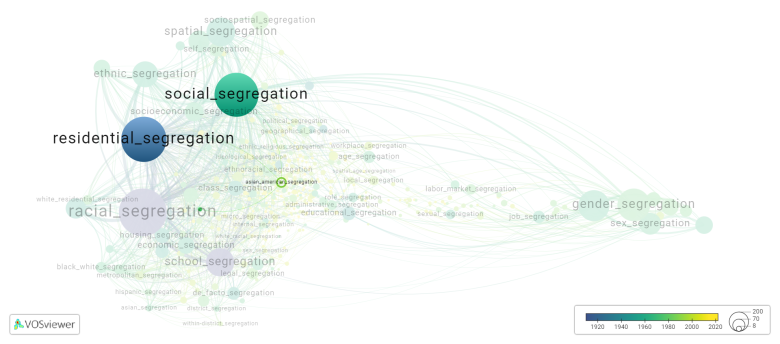Asian american segregation: Difference between revisions
(Creating page) |
(Creating page) |
||
| (4 intermediate revisions by the same user not shown) | |||
| Line 13: | Line 13: | ||
It is important to note that Asian American experiences with segregation can vary depending on factors such as country of origin, socioeconomic status, and generational status. Additionally, the experiences of Asian Americans are informed by intersecting forms of discrimination, including sexism, xenophobia, and racism, among others. | It is important to note that Asian American experiences with segregation can vary depending on factors such as country of origin, socioeconomic status, and generational status. Additionally, the experiences of Asian Americans are informed by intersecting forms of discrimination, including sexism, xenophobia, and racism, among others. | ||
==== | ==See also== | ||
==Related segregation forms== | |||
Asian american segregation is frequently discussed in the literature with the following segregation forms: | |||
[[residential segregation]], [[social segregation]], [[american residential segregation]] | |||
[[File:asian_american_segregation.png|780x780px]] | |||
This visualization is based on the study [[Segregation_Wiki:About| The Multidisciplinary Landscape of Segregation Research]]. | |||
For the complete network of interrelated segregation forms, please refer to: | |||
* [https://tinyurl.com/2235lkhw First year of publication] | |||
* [https://tinyurl.com/2d8wg5n3 Louvain clusters] | |||
* [https://tinyurl.com/223udk5r Betweenness centrality] | |||
* [https://tinyurl.com/244d8unz Disciplines in which segregation forms first emerged (Scopus database).] | |||
==References== | ==References== | ||
==Notes== | ==Notes== | ||
<references /> | <references /> | ||
{{NoteAI}} | {{NoteAI}} | ||
==Asian | ==Asian american segregation appears in the following literature== | ||
Zhang Q. (1998 | Zhang Q. (1998). Residential segregation of Asian Americans in the Atlanta metropolitan area, 1990. ''Southeastern Geographer'', ''38''(2), 125-141. University of Georgia.https://doi.org/10.1353/sgo.1998.0016 | ||
Latest revision as of 07:17, 16 October 2024
Date and country of first publication[1][edit | edit source]
1998
United States
Definition[edit | edit source]
Asian American segregation refers to the historical and ongoing social, economic, and spatial separation of Asian Americans in the United States. Asian Americans have faced various forms of segregation throughout history, including residential segregation, occupational segregation, and racial discrimination.
Residential segregation has been a major factor in Asian American segregation. In the past, Asian American communities were often confined to designated areas known as Chinatowns or Japantowns. These neighborhoods were created due to racial exclusionary laws, such as the Chinese Exclusion Act of 1882 and the internment of Japanese Americans during World War II. While Asian Americans have since dispersed and settled in various neighborhoods across the country, patterns of residential segregation still persist.
Occupational segregation is another form of segregation experienced by Asian Americans. They have been disproportionately represented in certain industries such as technology, engineering, and healthcare, while being underrepresented in leadership positions in broader sectors and industries. This occupational concentration can limit opportunities for upward mobility and perpetuate stereotypes about the capabilities and limitations of Asian Americans.
Racial discrimination and bias also contribute to Asian American segregation. Asian Americans have historically faced discrimination in education, employment, and other areas of life. These experiences can create barriers to integration and contribute to the continued separation of Asian Americans from the larger society.
It is important to note that Asian American experiences with segregation can vary depending on factors such as country of origin, socioeconomic status, and generational status. Additionally, the experiences of Asian Americans are informed by intersecting forms of discrimination, including sexism, xenophobia, and racism, among others.
See also[edit | edit source]
Related segregation forms[edit | edit source]
Asian american segregation is frequently discussed in the literature with the following segregation forms:
residential segregation, social segregation, american residential segregation

This visualization is based on the study The Multidisciplinary Landscape of Segregation Research.
For the complete network of interrelated segregation forms, please refer to:
References[edit | edit source]
Notes[edit | edit source]
- ↑ Date and country of first publication as informed by the Scopus database (December 2023).
At its current state, this definition has been generated by a Large Language Model (LLM) so far without review by an independent researcher or a member of the curating team of segregation experts that keep the Segregation Wiki online. While we strive for accuracy, we cannot guarantee its reliability, completeness and timeliness. Please use this content with caution and verify information as needed. Also, feel free to improve on the definition as you see fit, including the use of references and other informational resources. We value your input in enhancing the quality and accuracy of the definitions of segregation forms collectively offered in the Segregation Wiki ©.
Asian american segregation appears in the following literature[edit | edit source]
Zhang Q. (1998). Residential segregation of Asian Americans in the Atlanta metropolitan area, 1990. Southeastern Geographer, 38(2), 125-141. University of Georgia.https://doi.org/10.1353/sgo.1998.0016
